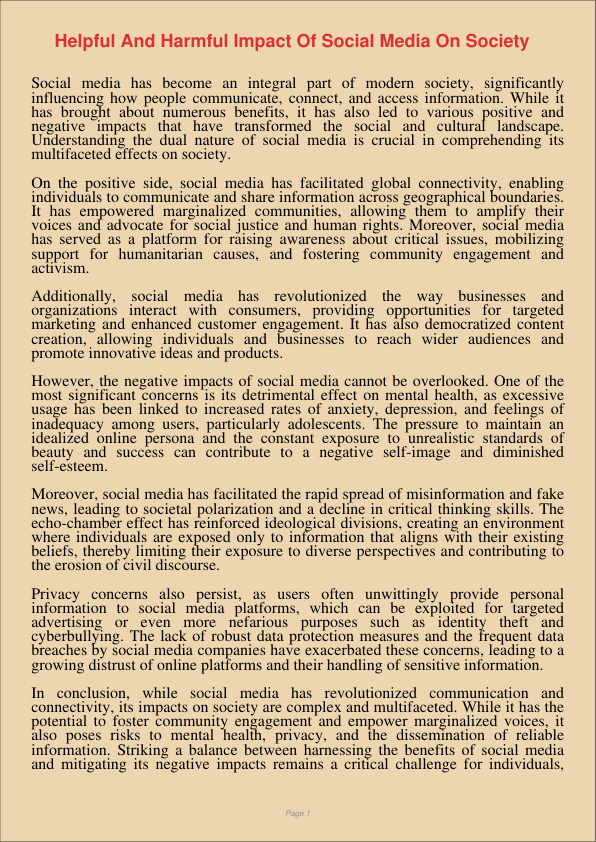Helpful And Harmful Impact Of Social Media On Society
Dec 31, 2023
social media
harmful impact
Gender & Sexual Studies
Religion and Theology

Social media has become an integral part of modern society, significantly influencing how people communicate, connect, and access information. While it has brought about numerous benefits, it has also led to various positive and negative impacts that have transformed the social and cultural landscape. Understanding the dual nature of social media is crucial in comprehending its multifaceted effects on society.
On the positive side, social media has facilitated global connectivity, enabling individuals to communicate and share information across geographical boundaries. It has empowered marginalized communities, allowing them to amplify their voices and advocate for social justice and human rights. Moreover, social media has served as a platform for raising awareness about critical issues, mobilizing support for humanitarian causes, and fostering community engagement and activism.
Additionally, social media has revolutionized the way businesses and organizations interact with consumers, providing opportunities for targeted marketing and enhanced customer engagement. It has also democratized content creation, allowing individuals and businesses to reach wider audiences and promote innovative ideas and products.
However, the negative impacts of social media cannot be overlooked. One of the most significant concerns is its detrimental effect on mental health, as excessive usage has been linked to increased rates of anxiety, depression, and feelings of inadequacy among users, particularly adolescents. The pressure to maintain an idealized online persona and the constant exposure to unrealistic standards of beauty and success can contribute to a negative self-image and diminished self-esteem.
Moreover, social media has facilitated the rapid spread of misinformation and fake news, leading to societal polarization and a decline in critical thinking skills. The echo-chamber effect has reinforced ideological divisions, creating an environment where individuals are exposed only to information that aligns with their existing beliefs, thereby limiting their exposure to diverse perspectives and contributing to the erosion of civil discourse.
Privacy concerns also persist, as users often unwittingly provide personal information to social media platforms, which can be exploited for targeted advertising or even more nefarious purposes such as identity theft and cyberbullying. The lack of robust data protection measures and the frequent data breaches by social media companies have exacerbated these concerns, leading to a growing distrust of online platforms and their handling of sensitive information.
In conclusion, while social media has revolutionized communication and connectivity, its impacts on society are complex and multifaceted. While it has the potential to foster community engagement and empower marginalized voices, it also poses risks to mental health, privacy, and the dissemination of reliable information. Striking a balance between harnessing the benefits of social media and mitigating its negative impacts remains a critical challenge for individuals, policymakers, and technology companies alike. Promoting digital literacy, responsible usage, and robust data protection measures are crucial steps toward creating a more positive and sustainable digital environment.